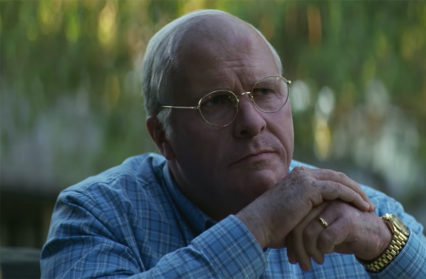Adam McKay’s Vice, a new Hollywood biopic of former United States Vice President Dick Cheney, lets the architects of the current global political rot off the hook, argues Francesca Montemaggi.
Vice is a missed opportunity. A more coherent, subtle, and ironical effort could have presented Dick Cheney as a key actor in ushering in the descent into the current paranoia, conspiracy theories, and anti-establishment populism. Dick Cheney was Secretary of Defense to George Bush and Vice President to George W. Bush. He played a key role in the ‘radicalisation’ of the Republican Party and in taking advantage of the 9/11 attacks to invade Iraq. Iraq broke new ground in the amount and quality of lies governments are prepared to tell their citizens. Reality didn’t matter anymore. The emotions aroused through a bogeyman (Saddam Hussein) and terror were all that was needed to justify callous action at home (Patriot Act) and abroad.
In the clumsy hands of Adam McKay, the film becomes an example of our loss of a moral and political compass. It is Trumpesque in its portrayal of Dick Cheney as the puppet-master holding the strings of President George W Bush. Thanks to Christian Bale’s interpretation, Cheney is not cartoonish, but an evil shadowy figure that controls everything and everybody. At times it feels like it’s evil for evil’s sake, which might explain why Christian Bale stated that he found the inspiration for his interpretation of Cheney in the devil. The problem is that Cheney is a real human being not the incarnation of the devil. It has been noted that Cheney shares very much the conservative ideology of the Republican Party. He’s not a cynical operator, but deeply ideological. The film does nothing to help us understand who Cheney really is.
There is no sense of history in Vice, no sense that the ideas and beliefs that have shaped decades have anything to do with Dick Cheney and the brutalisation of American democracy during the Presidency of George W. Bush. Beliefs are laughed out of the picture in an exchange between Donald Rumsfeld and a young Cheney. This suggests that Cheney & co. had no beliefs themselves, only naked self-interest, except the two are not mutually exclusive. Beliefs play an important role in legitimising how people understand reality and consequently what is justified. That includes politicians of all stripes, whose beliefs about reality and what is right and wrong legitimise the actions they take. If you start questioning what you think you know, you lose your epistemological compass, you don’t know what you know about reality and how to understand it. To cite none other than Donald Rumsfeld, one’s ‘known knowns’ risk becoming ‘unknown unknowns’.
We’ve become suspicious of authority because our governments lie to the people, egregiously so in the case of the Vietnam War, but so have corporations and local authorities, as in the recent case of the Flint water scandal. The current deluge of investigative documentaries shining a light on the murky side of business and politics feeds on our suspicion of the establishment and cynicism; yet they do so by appealing to moral outrage, while Vice gloats about it. The film’s pretensions to be a critique of a corrupt system fall flat under the weight of self-indulgent and exaggerated humour. Vice does not uphold any morality or truth on which basis to denounce Cheney. It embraces contemporary disenchantment and nihilism turning everything, including torture and war, into entertainment.
Vice is Trumpesque. It’s an instance of postmodern hyper-reality. As Baudrillard argued, in a world dominated by media, people prefer the hyper-real, the fake reality of Disney theme-parks, reality TV, and celebrities. It’s all a game. It’s entertainment. The boundaries between entertainment and the paranoia of conspiracy theorists have become blurred. The fragmentation and diversification of media has created a vacuum of authoritativeness and trustworthiness leading to a deep mistrust for the establishment. Reality fades away. There’s nothing in which we can believe. In embracing such disenchantment and nihilism, Vice is an expression of the current paranoia that authorities lie to us, use us, and poison us. In the final scene, Cheney speaks to camera saying that he did ‘what you asked.’ He doesn’t sound like the devil, but a TV celebrity blaming the excesses of his show on the tastes of the audience.
You might also like:
Gary Raymond looks at the latest feature film from writer-director Aaron Sorkin, The Trial of the Chicago 7, an energetic dramatisation of the controversial trial in 1969 of eight men associated with leading the anti-War movement against American involvement in Vietnam, a trial widely remembered as a Nixonian political witch hunt.












